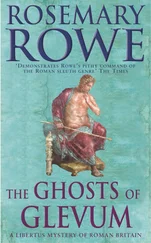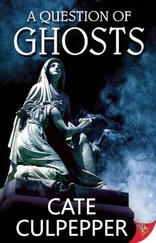Gillian Bradshaw - Island of Ghosts
Здесь есть возможность читать онлайн «Gillian Bradshaw - Island of Ghosts» весь текст электронной книги совершенно бесплатно (целиком полную версию без сокращений). В некоторых случаях можно слушать аудио, скачать через торрент в формате fb2 и присутствует краткое содержание. Жанр: Исторические приключения, на английском языке. Описание произведения, (предисловие) а так же отзывы посетителей доступны на портале библиотеки ЛибКат.
- Название:Island of Ghosts
- Автор:
- Жанр:
- Год:неизвестен
- ISBN:нет данных
- Рейтинг книги:3 / 5. Голосов: 1
-
Избранное:Добавить в избранное
- Отзывы:
-
Ваша оценка:
- 60
- 1
- 2
- 3
- 4
- 5
Island of Ghosts: краткое содержание, описание и аннотация
Предлагаем к чтению аннотацию, описание, краткое содержание или предисловие (зависит от того, что написал сам автор книги «Island of Ghosts»). Если вы не нашли необходимую информацию о книге — напишите в комментариях, мы постараемся отыскать её.
Island of Ghosts — читать онлайн бесплатно полную книгу (весь текст) целиком
Ниже представлен текст книги, разбитый по страницам. Система сохранения места последней прочитанной страницы, позволяет с удобством читать онлайн бесплатно книгу «Island of Ghosts», без необходимости каждый раз заново искать на чём Вы остановились. Поставьте закладку, и сможете в любой момент перейти на страницу, на которой закончили чтение.
Интервал:
Закладка:
“Do you want me to collect his scalp?” he asked.
“No,” I answered. “The customs are different here.”
XVII
I was in the hospital in Corstopitum for fourteen days. I didn’t need to stay there so long, but I was technically under arrest for the whole of that time, and no one wanted to put me in the prison. Pervica came down from Cilurnum with Eukairios, and they found a place to stay in the town and came to keep me company. Eukairios started to teach me to write, and read me letters about what was happening elsewhere.
The mutiny was strangled on the twenty-third of January, the day before it was scheduled to take place. The legate Julius Priscus ordered the arrest of a number of his officers, then resigned and allowed the spies of the grain commissary to arrest his wife. Bodica wrote a letter to Arshak, not knowing that he was already dead, and poisoned herself in the prison. A lot of people afterward who hadn’t seen the letter claimed they had, and cited it as scandalous and salacious, but it wasn’t; Facilis showed it to Eukairios, who repeated it to me. “Aurelia Bodica, to Arsacus, prince-commander of the second dragon, greetings,” it said. “My white heart, we have been betrayed. I would have made you a king, as you deserve, but the gods have decreed otherwise. The purposes of the Hooded Ones are hard to understand. They did not effect my curse and my prayers have gone unheard. Yet I beg them again to hear me, and to receive my spirit, and yours. Farewell.”
I still don’t know if she had, as Facilis thought, committed adultery, and it still doesn’t seem very important. She had undoubtedly betrayed her husband, but at least she genuinely loved the man she had chosen in his place. I did not forgive her for her pleasure in drowning me, let alone for Vilbia, but it was some relief to learn that she was, after all, a human being, and not the demon she had appeared.
Siyavak, who had indeed been arrested with his pretended allies, was released on Bodica’s death and publicly proclaimed the discoverer of the conspiracy, a hero of the Roman state-which cannot have pleased him-and the revenger of Gatalas, which I know did. He was given the kind of decorations Romans always give to award conspicuous courage-a silver spear, a golden crown, and an assortment of armbands, torques, and medals. He was also confirmed as commander of the Fourth Sarmatians, and his liaison officer, Victor, was recalled to the headquarters of the Sixth Legion. Siyavak sent me a letter announcing his satisfaction at revenging Gatalas’ death and at receiving honors from the Romans, which, he said, had greatly pleased his men. He also congratulated me for killing Arshak. “I’ve heard that the Romans revile you for fighting him when he would have been arrested anyway,” he wrote, “and the man who writes this letter deplores it. But it was honorably done, Prince, and I was glad to hear of it, for I would have been ashamed to see him, the descendant of kings, imprisoned and executed by the Romans. I look forward to seeing you again, and hearing of the combat, which I’ve been told was terrifying both for its skill and for its ferocity.”
Pervica had one very surprising piece of news from her druid acquaintance. It seemed that the druids of the North had held their convocation and that, with Cunedda dead and the rest of the extreme sect in fear, the whole meeting had swung over to her friend Matugenus. Instead of being branded a heretic lover of Rome, he was a hero of the true religion. The meeting had denounced “those who betray their own people to foreign plunderers out of hatred of their enemies,” and voted that human sacrifice of an unwilling victim was blasphemous. The followers of the old religion all over the North were delighted with Matugenus, and Matugenus was enormously pleased with himself. Through Pervica he sent me a message saying that he would pray for my swift recovery, and offering me the friendship of his order.
That was immediately after the rebellion was crushed. A few days later we heard that the grain commissary, less careful than Facilis, was arresting any druids they could find and torturing them until they confessed to having some part in the conspiracy. Unlike Facilis, the commissary struck blindly. They had no list of druids, only the reports of their own informers. They didn’t take many men, but they did grab everyone whose name was reported to them. Matugenus’ name was on everyone’s lips-and he was among those taken.
Pervica went to Facilis and told him that Matugenus was innocent, that he’d led the opposition to Cunedda. Facilis told me that he knew that from others and had said as much to the intelligence officers, but that the only interest they took in it was to ask him who his informants were: for him to intervene again would be no help to Matugenus, and could put more lives at risk. There was nothing we could do.
The governor of Britain, Quintus Antistius Adventus, arrived in Eburacum to decide what to do about the mess of the northern army on the eighth of February. The summons for me to go there had come some time before, on the third. I was carried down in a horse litter, much to my disgust. I told everyone that I had ridden seven hundred miles from Aquincum with my leg in a splint, so I could perfectly well ride a mere seventy-five or eighty to Eburacum, but everyone disregarded me completely. The doctor in Corstopitum said I must not put any strain on the bone, that my riding with it in a splint had done it considerable damage before, and that the only good thing about it breaking again was that now it could at least set straight. Even my bodyguard sided with the doctor, and Facilis gleefully pointed out that I was under arrest and had no choice about which way I traveled. So I went to Eburacum lying on my back in a litter, like a Roman senator’s wife.
Facilis rode along beside me, with Longus, a squadron of Asturians, and a cavalry cohort from the First Thracians under Titus Ulpius Silvanus. Eukairios and Pervica came as well, Pervica driving her farm cart and Eukairios riding my red bay, but all of my own men were left at home. Facilis promised them that the arrest was only a formality, but said that even so, a man charged with murder really could not go to trial with a bodyguard and several squadrons of armored horsemen at his back. They protested angrily at this. I had to have all the captains summoned to the hospital, so that I could command them to obey their oaths. The Romans promised them that no one was likely to execute me, reminding them that the arrest was just a formality. Eventually they yielded, though sullenly. I charged Leimanos and Banadaspos with making sure they behaved with grace during my absence. Comittus also stayed behind, partly because the fort required at least one senior officer, but also, I think, because he didn’t want his own connections inspected at Eburacum.
When I arrived in Eburacum, I was put in the fort hospital-again to keep me out of the prison-while my friends found lodgings in the town or squeezed into fort buildings already crowded with the governor’s staff. The next morning a party of soldiers in old-fashioned strip armor and cap helmets marched into my room carrying a sedan chair and asked if I were Ariantes, commander of the Sixth Numerus of Sarmatian Horse. I agreed that I was.
“Then we’ll take you to see the governor,” said their spokesman. “We’re with the Second Numerus of the Consular Guard. He’s sitting in judgment now, and your case is next.”
I looked down and rubbed my knee, trying to collect myself. I felt very nervous and unsure of myself, now that it had come to the point. I did not believe that the authorities particularly wanted to punish me for killing Arshak, now that he had been exposed as an oath-breaker. On the other hand, duels between commanders were not something that the Roman state would want to encourage. They might punish me with demotion to make an example of me to the next eight dragons. They could even conceivably execute me. I was glad that my bodyguard had been left behind in Cilurnum, but I wished I had a friend with me now.
Читать дальшеИнтервал:
Закладка:
Похожие книги на «Island of Ghosts»
Представляем Вашему вниманию похожие книги на «Island of Ghosts» списком для выбора. Мы отобрали схожую по названию и смыслу литературу в надежде предоставить читателям больше вариантов отыскать новые, интересные, ещё непрочитанные произведения.
Обсуждение, отзывы о книге «Island of Ghosts» и просто собственные мнения читателей. Оставьте ваши комментарии, напишите, что Вы думаете о произведении, его смысле или главных героях. Укажите что конкретно понравилось, а что нет, и почему Вы так считаете.












